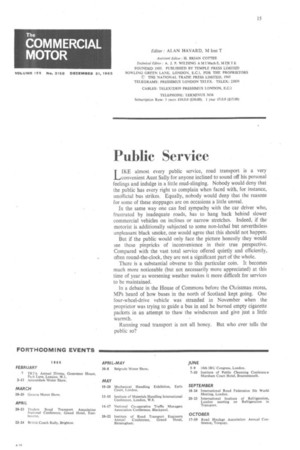Public Service
Page 17

If you've noticed an error in this article please click here to report it so we can fix it.
LIKE almost every public service, road transport is a very convenient Aunt Sally. for anyone inclined to sound off his personal feelings and indulge in a little mud-slinging. Nobody would deny that the public has every right to complain when faced with, for instance, unofficial bus strikes. Equally, nobody would deny that the reasons for some of these stoppages are on occasions a little unreal.
In the same way one can feel sympathy with the car driver who, frustrated by inadequate roads, has to hang back behind slower commercial vehicles on inclines or narrow stretches. Indeed, if the motorist is additionally subjected to some non-lethal but nevertheless unpleasant black smoke, one would agree that this should not happen.
But if the public would only face the picture honestly they would see these pinpricks of inconvenience in their true perspective. Compared with the vast total service offered quietly and efficiently, often round-the-clock, they are not a significant part of the whole.
There is a substantial obverse to this particular coin. It becomes much more noticeable (but not necessarily more appreciated) at this time of year as worsening weather makes it more difficult for services to be maintained.
In a debate in the House of Commons before the Christmas recess, MPs heard of how buses in the north of Scotland kept going. One four-wheel-drive vehicle was stranded in November when the proprietor was trying to guide a bus in and he burned empty cigarette packets in an attempt to thaw the windscreen and give just a little Warmth.
Running road transport is not all honey. But who ever tells the public so?




















































































